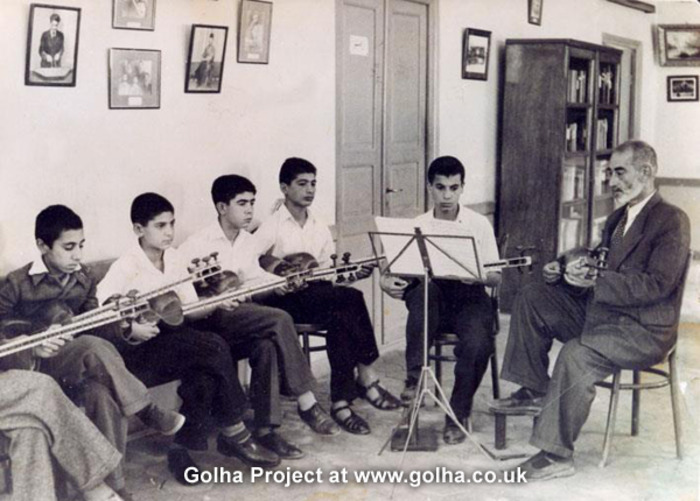Musa Ma‘rufi

Biography
Ma‘rufi, Musa (1889-1965)
Instrumentalist and instructor of the tar, expert in the repertoire of classical Persian music as well as one of the most eminent Persian classical musicians over the last one hundred years. He was born into an aristocratic Qajar family but owing to his feeling of devotion to the well-known mystic Ma‘ruf Karkhi, he changed his surname from Amin al-Mulk to Ma‘rufi. He studied the tar with Mirza Husayn Quli and Darvish Khan and received the emblem of golden Sufi battle-axe (tabarzin) from the latter (marking his progress in matters both musical and mystical). He also studied music at the conservatory of ‘Ali Naqi Vaziri. He figures as one of the most prominent tar instrumentalists and composers of Persian classical music, his work being characterized by moderate traditionalism derived from the work of Darvish Khan combined with the modernism of Vaziri.
His performances on the tar, both as a soloist and as an instrumentalist accompanying vocalists, were first recorded on gramophone records between 1928 to 1935. His lovely compositions were later performed by the Golha orchestra arranged by Ruhu’llah Khaliqi and Javad Ma‘rufi, accompanied by eminent vocalists like Ghulam Husayn Banan and Ilahi. His magnum opus was the publication of the grand collection of the repertoire of Persian classical music, over which he laboured constantly for a period of forty years, which finally appeared in print in 1963. Owing to his Sufi and religious inclinations, from 1950 onwards he retired from active performing on the tar, contenting himself solely with teaching at the National Conservatory of Music. Ma‘rufi’s repertoire as performed by Sulayman Ruhafza has been recorded. Although he did not contribute directly to the Golha programmes, he did assist its organizers in an advisory and supervisory capacity.
His works include the gramophone records entitled Humayun and Kurd-i Bayat (Germany: Beidaphone 1934-36), the above-mentioned Grand Repertoire of Persian Music (Tehran: Farhang u Hunar 1960), and a collection of essays edited by Sayyid ‘Ali Riza Mir‘alinaqi (Tehran Mu‘in 2009).
Sayyid ‘Ali Riza Mir‘alinaqi